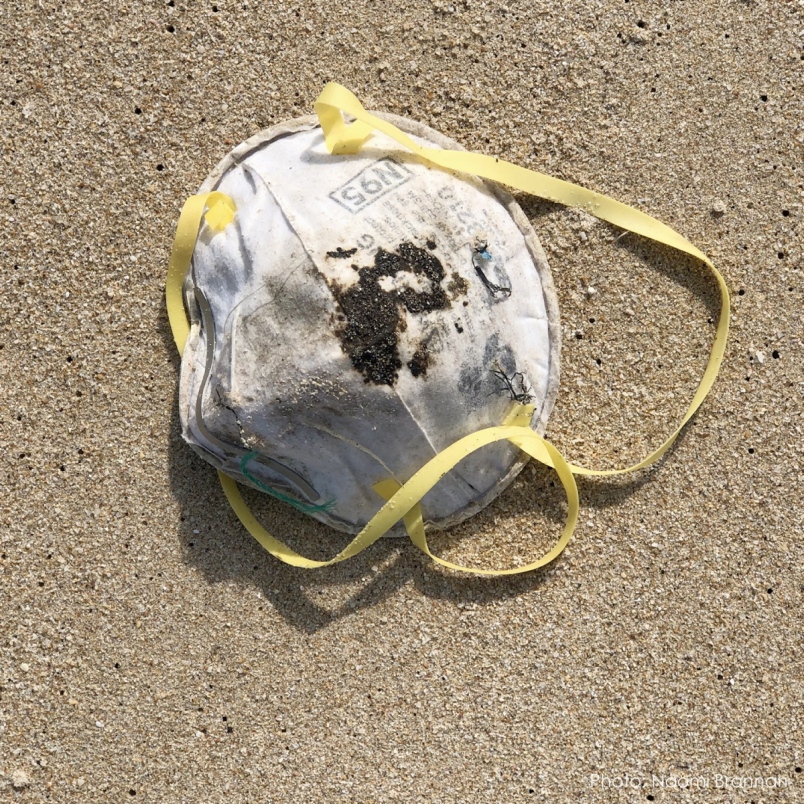Ocean advocate raises alarm as masks wash up on beaches

Dhaka, 11 May, 2020: Single-use face masks are washing up on Hong Kong beaches, threatening marine life and raising questions about hygienic disposal of the masks, says a Saanich researcher in marine plastic pollution.
The COVID-19 outbreak has resulted in the widespread use of face masks in South East Asia, some of which have been improperly discarded, says Teale Phelps Bondaroff, director of research for OceansAsia, which investigates wildlife crimes with the aim of bringing those who destroy and pollute marine ecosystems to justice. “It really highlights the fact we are treating our oceans like garbage dumps.”
Environmentalists say marine trash, including single-use plastics, was already a problem.
For the past five months, OceansAsia co-founder Gary Stokes has conducted twice-monthly investigations around South East Asia, sweeping a remote beach in the Soko Islands looking for micro-plastic pollution, and conducting other beach-debris research.
The Soko Islands are a small cluster of islands off the southwest coast of Lantau Island in Hong Kong, which has a population of 7.4 million.
As COVID-19 spread, masks began appearing on the high-tide line and foreshore.
“Rather than finding the usual one or two face masks, we started to encounter a tonne,” said Phelps Bondaroff. “My colleague found 70 face masks along a 100-metre section of beach on Feb. 28. That was six weeks after the widespread wearing of masks [began].”
Masks continue to wash up on beaches around Hong Kong daily, said Phelps Bondaroff, citing serious deficiencies with waste-management systems in the region, along with marine plastic pollution.
“I hope it is not an issue that arises here on the coast, but it does underscore some of the unforeseen impacts of these types of health crises, and also can serve to identify deficiencies with waste management and public education,” said Phelps Bondaroff.
The garbage at the Soko Islands research site is so plentiful that OceansAsia was able to assemble all the furniture typically in a bachelor apartment — fridge, television, chair.
“We do a bit of CSI kind of tracking the sources of the plastic and the pollution,” said Phelps Bondaroff.
“If you can identify the source of the trash and the pollution, you can then go to the source and have them not dump their trash in the ocean or deal with a waste-management issue that’s causing the waste to enter the ocean in the first place.”
“The idea is to follow the trash back to the supply chain.”
The researchers had already found that it took about six weeks for certain kinds of trash from Hong Kong to arrive via currents and tides to the Soko Islands.
Stokes posted his photos of discarded face masks that had washed up onshore on OceansAsia’s website with the caption: “When you suddenly have a population of 7 million people wearing one or two masks per day the amount of trash generated is going to be substantial.”
The masks being found are made of different materials, including plastic microfibres, polypropylene and cotton. They likely blew or fell into the water — off land, boats, heaping landfills on the water’s edge or development sites — and were carried by currents and tidal action, said Phelps Bondaroff, adding that as the pandemic evolves, it’s important that communities look at how they are disposing of potentially hazardous waste.
“If someone has a mask, it really does defeat the purpose of keeping themselves and others safe if they are not disposing of it safely,” he said. “Not only that, it’s the marine environment. Marine plastic is just about animals. It can poison corals.”
When plastic enters the marine ecosystem, it breaks into finer micro plastics that can be ingested by wildlife and accumulate through the food chain.
“A healthy ocean and an unhealthy ocean looks very similar from the surface and it’s very difficult for people to realize that the ocean’s capacity to absorb trash is not infinite and we need to treat it with respect,” Phelps Bondaroff said.
The World Health Organization says masks are only effective in combination with frequent hand washing.
If someone does wear a mask, WHO recommends removing it from behind and discarding it immediately in a closed bin, then cleaning your hands with soap and water or alcohol-based hand rub.

